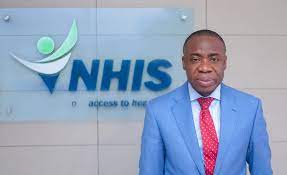The Chief Executive Officer of the National Health Insurance Authority (NHIA), Dr Aboagye Dacosta has raised alarm about the increasing rate of Non-Communicable Diseases (NCDs) in Ghana describing them as the next pandemic.
He emphasised that immediate and proactive measures are essential to prevent these diseases from becoming widespread and causing severe health and economic impacts.
He asserted that people need to take this concern seriously and tackle it from the root causes.
In an interview with Joy FM’s Super Morning Show on Monday after the airing of JoyNews' latest hotline documentary titled, "NCDs - The Silent Epidemic", Dr Dacosta highlighted the urgency of addressing NCDs from their root, saying “Prevention is crucial for healthy living".
“I believe that NCDs are the next pandemic."
“From the NHIS point of view, we believe that for our 20-year history, it has been curative, so you wait for people to be sick before they go to the hospital that is not right, so the new reforms coming in won’t be focusing on preventive health care using the biomedical approach.”
“So we will be introducing what we call the annual health check to detect these NCDs at the early stage.”
A key component of these reforms is the introduction of annual health checks to detect NCDs early. “This initiative will help increase life expectancy, reduce the financial burden on the NHIS, and contribute to achieving the Sustainable Development Goals, particularly Goal 3, which promotes wellness,” Dr Dacosta explained.
Drawing from his experience in the Ghana Health Service, Dr Dacosta noted that wellness clinics play a vital role in preventive healthcare.
"All health facilities are now required to have wellness clinics where individuals can check their vitals and receive counselling on nutrition and lifestyle. Although the programme hasn’t started yet, we plan to send text messages to individuals on their birthdays, reminding them to visit the nearest health facility for essential checks such as blood sugar, blood pressure, and weight.”
Addressing the significant drivers of NCDs, Dr Dacosta pointed out that hypertension and diabetes are major concerns.
“In going forward, we will try and also add other labs in terms of HPV and the others so we want to start from somewhere so that we learn from it and continue with it.”
Furthermore, Dr Dacosta stressed the importance of preventive approaches to kidney disease, “So the dialysis we talk about is at the end stage, so it is time for us to take or come to the basis and say that, no, let's address this head-on, right from the preventive aspect then we will see that, initially the cost may go high as we do that, but you will see that cost burden will reduce overtime, so this is the NHIS approach in terms of how to deal with it.
Latest Stories
-
Wa West MP attends 10th Our Ocean Conference in South Korea
5 minutes -
“If campaign donations mean corruption, then 276 MPs are thieves – including you” – AG to A Plus
6 minutes -
Kelvin Gyimah: Dr Bawumia’s only sin (Article)
11 minutes -
Over 500,000 Ghanaians to benefit from National Apprenticeship Programme
31 minutes -
FA bars transgender women from women’s football
46 minutes -
Safeguard judicial independence, don’t politicise chief justice removal – AJIF warns
58 minutes -
Bawumia visits injured KNUST student at Komfo Anokye Hospital
1 hour -
NPP National Chairman takes temporary break from nationwide ‘Thank You Tour’
1 hour -
Photos: National Apprenticeship Programme launch
1 hour -
Charlotte Osei, Totobi Quakyi and 7 others appointed to Ghana Gas Board
1 hour -
Mahama pledges decent jobs, economic stability as Ghana marks Workers’ Day
2 hours -
From headlines to high finance: Matilda Asante-Asiedu named 2nd deputy governor of Bank of Ghana
2 hours -
Man jailed seven years for defiling minor in Wa
2 hours -
Nigerian artiste Shaiyboy and top producer SB arrive in Ghana
2 hours -
Philadelphia Eagles and IMOTEP embark on third community project in Volta Region
2 hours

